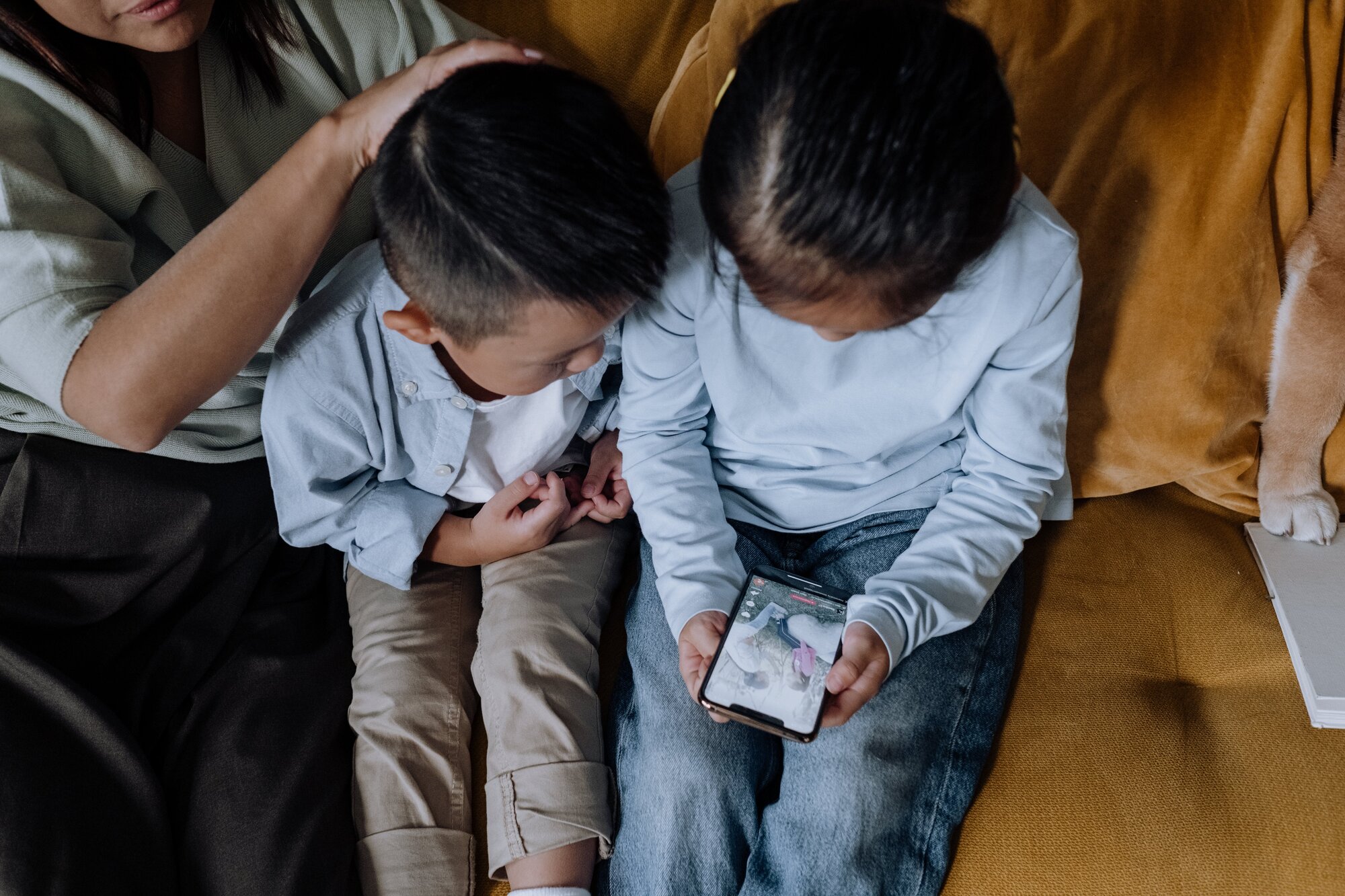FREE STANDARD SHIPPING, ALWAYS
20 Expert Tips for Building Healthy Family Relationships
Published 8/29/24

Advice
In between packing school lunches, getting the kids dressed, and walking the dog, you may suddenly stop and think, “What am I doing?!” It’s easy to get caught up in the daily whirlwind, but having a family is more than just managing the beautiful chaos and enforcing rules. It’s about creating a nurturing space where every member feels valued, heard, and supported. Beyond the hustle, it’s those shared moments and connections that truly make a family strong.
Whether you're navigating the joy of welcoming a newborn, the buzz of a growing household, or simply trying to keep everyone connected in the digital age, the key lies in nurturing relationships that stand the test of time. But where do you start? Building healthy family relationships can start with simple, mindful actions. Check out these 20 expert tips and learn how you can transform your family’s bond into something truly extraordinary.
Create a Safe Space to Talk Openly
Whether it’s around the dinner table every night or in the car on the way to soccer practice, get chatty! Honest conversation builds stronger connections, gives emotional support, and makes for more confident kids.
Not sure what to talk about? Ask any of these questions that dig deeper than just how was your day? Or, flip through a photo book of memories together. Fun fact: printed photos are known to spark elaborative reminiscing and storytelling amongst families. Read more here.
It’s Tradition!
Do you remember going to the same Christmas tree farm every year with your family to pick the perfect tree or the coziness of family movie nights growing up? Give those same warm, fuzzy feelings to your own family by creating your own traditions. Traditions can give your family a sense of stability and your kids’ a sense of identity which are both qualities of a strong family.
Whether it’s implementing a weekly family game night or a monthly baking competition, your family will thank you for it with lots of laughs and happy memories to look back on. Plus, pro tip: add them to a photo book! And make creating a yearly photo book of your year’s best memories together as a family a new, easy family tradition everyone will love.

Hang Out With Each Other
This may seem pretty obvious but it’s easy to get caught in the frenzy of everyday tasks and forget to make time for each other. After all, time is the most valuable thing there is and choosing to spend it with the people you love has positive benefits for everyone involved.
According to Behavioral Health expert Dr. Todd Thatcher, family quality time improves mental health, lowers risks of behavioral problems, and boosts self-confidence. Pencil it into everyone’s calendar, whether it’s once weekly Sunday dinners or nightly evenings spent together. You’ll be so glad you did.
Everyone Has a Clear Role
You can be a parent to your kids and still be nurturing and supportive. This means setting rules for your family but still taking into account your kids’ viewpoints, though you don’t always have to agree with them.
This is called an “authoritative parenting” style. According to the American Psychological Association, “Children raised with this style tend to be friendly, energetic, cheerful, self-reliant, self-controlled, curious, cooperative and achievement-oriented.”

Really Listen to One Another
Try practicing the three components of active listening which are: expressing interest verbally and with body language, paraphrasing, and asking the other person to speak more on the subject.
So the next time your kiddo wants to bring up his excitement for his upcoming science fair, put your phone down, make eye contact, acknowledge his excitement, and ask him about his project ideas. Soon enough you’ll get the whole family to be active listening experts, a valuable skill they’ll be able to apply to many facets of life.
Teach It’s Ok to Feel Your Feelings
Emotions, we’ve all got them, but knowing what to do with them is key. Teach children and family members that it’s okay to express emotions, both positive and negative, in healthy and constructive ways. Consider creating a “Feelings Chart” to reflect on how feelings change during the day.

Set the Stage for Healthy Relationships
Whether it’s with your partner or other key family members, always try to demonstrate what a respectful and supportive relationship looks like. Having each other’s backs if the other can’t do their usual tasks, and talking out disagreements in healthy ways are great ways to demonstrate this. By doing so, you’re serving as a role model to your kids and how they’ll deal with relationships when they’re older.
Resolve Conflicts Constructively
Instead of viewing conflict as an anger-inducing, hair-pulling mess, look at it more as a great learning opportunity and a problem to solve. By doing so, you’re taking the anger and frustration out of the equation, which is monumental for young kiddos to learn. The four steps to calmly resolving conflict are: communication, active listening, reviewing options, and ending with a win-win situation.

R-E-S-P-E-C-T
Like the great Aretha Franklin once sang, find out what it means to me, or, in this instance, to you and your family. What exactly is respect? Kindness, manners, and having empathy for others all fall under the respect umbrella. Teach respect by valuing each other’s opinions and boundaries on a daily basis.
Support Individual Growth
Encourage each family member to pursue their interests and personal growth, while also supporting the family unit. Have you thought about taking up pottery or learning another language? Go for it! And encourage other family members to do the same, whatever their dreams may be. By pursuing your hobbies and interests, you’re teaching your family they can do the same.

Have Family Meals Together
Breaking bread with the ones you love is so much more than just the food. Whatever you can manage whether it’s a once-a-month family dinner out, a Sunday home cooked meal, or morning breakfasts everyday, sitting around a table, unplugged and engaged can work wonders for your family’s communication, connectedness, and overall bond.
Celebrate Wins, Big and Small
Your kiddo scored an A+ on their math quiz? Your partner landed a promotion at work? Your youngest learned how to tie their shoes? Those are all reasons to celebrate!
Whether it’s a “good job!” followed by a great big hug, or a reward like a special dinner or a stuffed animal, acknowledging your family member’s achievements helps build confidence and positivity.

Practice and Teach Financial Responsibility
By involving your kids in everyday financial decisions—like planning a grocery budget, discussing saving goals, or even talking about the importance of paying bills on time—you’re planting the seeds of smart money habits. It’s less about formal lessons and more about showing them, through real-life situations, how to manage money responsibly. Kids learn best by watching, so when they see you making thoughtful financial choices, they’re more likely to adopt those behaviors themselves.
Show Affection Regularly
Showing affection regularly is one of the simplest yet most powerful ways to strengthen family bonds. Whether it's a hug before bed, a kind word after a tough day, or just sitting together and talking, these small moments of connection build a foundation of love and trust.
When affection is part of your daily routine, it creates a warm, safe environment where everyone feels valued and supported. Plus, it’s a reminder that, no matter how hectic life gets, the love you share is always there to keep you connected.

It’s OK to Get Help When You Need It
Counseling and therapy exist for a reason! When the going gets tough, it doesn’t hurt to reach out for help from a professional. And by doing so, you’re teaching your family it’s ok to do so. Counseling has many benefits including deepening connections, improving communication, and working on self-awareness, which are all skills everyone could use.
Go With the Flow
Be flexible! Adapting to change is essential in family life, where the unexpected is often the norm. Whether it's adjusting to a new routine, embracing a different perspective, or finding creative solutions when plans go awry, adaptability helps keep the family running smoothly. It shows your kids that change is not something to fear, but an opportunity to grow and learn together.
By modeling resilience and flexibility, you're teaching your family how to navigate life's ups and downs with grace and a positive attitude, turning challenges into opportunities for connection and growth.

Involve Everyone in Decision-Making
Want your kiddos to grow up to be confident and thoughtful individuals? Empower them to think critically and understand the impact of their choice by involving them in decision making. Whether it’s choosing the next family vacation spot or deciding on weekly chores, including everyone in the conversation teaches valuable lessons in cooperation, compromise, and responsibility.
Show Stability
When family members know they can rely on each other, it builds trust and comfort that allows them to face challenges together. This sense of security can be cultivated through consistent routines, open communication, and showing unwavering support during tough times.
By providing a safe and predictable space, you’re not just meeting basic needs—you’re giving your family the confidence to explore, grow, and embrace life’s ups and downs with resilience and assurance.

Encourage Teamwork
Teamwork makes the dream work—especially in a family! Encouraging everyone to pitch in and work together not only gets things done faster, but it also strengthens your bond as a unit.
Whether it’s tackling a big project like redecorating a room or simply cleaning up after dinner, making teamwork a fun and rewarding experience teaches collaboration, patience, and the joy of shared accomplishment. Plus, the more you work together, the more you’ll appreciate each other’s strengths, and who knows—you might even uncover some hidden talents!
Maintain a Warm and Welcoming Home
Life can get chaotic, but keeping a positive atmosphere at home is like having a secret superpower. A little laughter, a dash of encouragement, and a whole lot of love go a long way in making your home a place where everyone feels uplifted.
It’s about turning the small wins into celebrations and the setbacks into opportunities for growth. When positivity is the default vibe, it’s contagious, making your home a warm and welcoming space where everyone feels happy and supported.
Building healthy family relationships is a lifelong journey, but the rewards are immeasurable. By fostering open communication, showing affection, and encouraging teamwork, you create a foundation of trust and support that will carry your family through life's ups and downs. Embrace the little moments, celebrate the big wins, and always remember that a strong family connection is built on love, respect, and understanding.